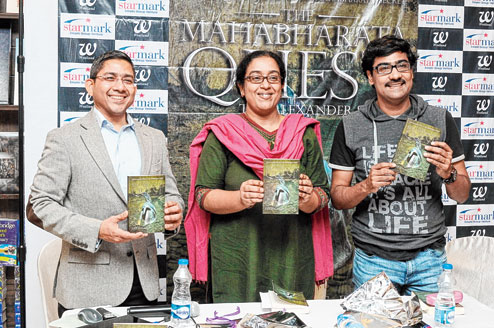 |
| Author Christopher C. Doyle, moderator Yajnaseni Chakraborty and actor-director Koushik Sen launch The Mahabharata Quest: The Alexander Secret. (Arnab Mondal) |
He writes on The Mahabharata and Alexander the Great. No wonder Christopher C. Doyle had a captive audience when he launched his second book The Mahabharata Quest: The Alexander Secret (Westland, Rs 295) at Starmark, South City Mall, earlier this month.
“While I was doing my research for this book and the mysteries surrounding Alexander the Great, I came across various interesting facts. Not much has been recorded of him. Apart from the written accounts of Callisthenes, the Greek historian, we do not really have any official records of Alexander and therefore how much of what we know is true is a moot point,” said the 48-year-old alumnus of IIM Calcutta, who turned author with The Mahabharata Secret in 2013.
Doyle began with a visual presentation and took the audience through the life of the great conqueror, pointing out some mysteries on the way.
Why didn’t Alexander tell his troops about his pothos (Greek for longing or yearning) to march to the Ends of the Earth?
Why did he turn back from the Beas and go no further?
He died in 323 BC. What killed him?
Based on his research, Doyle feels Alexander knew about a secret in The Mahabharata that would make him God. But he succumbed to an early death. As Doyle put it, it’s “a story waiting to be told”.
Actor-director Koushik Sen read out a few passages from the book. “Theatre has taught me to read between the lines and to discover visuals between the lines. What attracted me to this book is that I found human expressions. I could feel the characters. The sudden jump from the present to the past seemed almost cinematic. It did not bother me at all, in fact, I was happy to wait in order to know what happens next,” said Sen.
Doyle said that all facts mentioned in his books have been justified using scientific laws and he has had to read up extensively in order to create a believable hypothesis.
The Homes in the hills
Bernard T. Brooks, a former principal of Dr Graham’s Homes, recently launched his book Footprints of The First One Hundred Years: The Kalimpong Homes at Oxford Bookstore. The book is a loving tribute to an educational institution that was formed to take care of the needs of underprivileged children.
At the launch, Brooks spoke about his experiences as principal. “The years spent at Dr Graham’s Homes has been very special. Rather than relating incidents from my book, I would prefer to speak about the man who inspired me and gave me the confidence to pen down my most treasured thoughts, Dr John Anderson Graham, the founder of Graham’s Homes. Dr Graham introduced two magazines for the children and, on the basis of these magazines, donations used to come in. That is how the building expanded,” he said. Though Brooks had never met Dr Graham personally, he said, “his memoirs are the most precious possessions that I have.”
“The book is a great journal of historical incidents during my principal, B.T. Brooks’s time. The Nehru-Gandhi link, the Tibetan refugees immigrating after the 1962 war, Sikkim, the Gorkhaland movement and other events that had an impact on the educational institution have been beautifully portrayed. It is also a great book on leadership,” said Sujeev Shakya, an ex-student of Dr Graham’s Homes who is now a management consultant in Kathmandu.
 |
Mumbai-based scientist Paramita Mukherjee Mullick released a collection of her poems at Oxford Bookstore. Titled Life: A Collection of Poems, it has 60 poems written over five years.
Picture by Arnab Mondal










